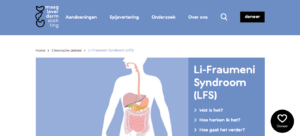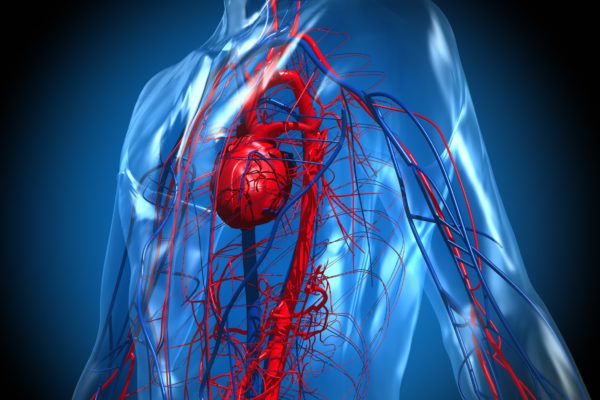
Maag lever darm stichting – Li-Fraumeni syndroom (NL)
The Li-Fraumeni syndrome (LFS) is a rare hereditary condition that causes its patients to have a substantially elevated chance of developing one or more types of cancer. Patients with LFS often contract cancer at a young age, sometimes even during childhood.
Frequently occurring types of cancer with Li-Fraumeni patients are breast cancer, bone cancer, brain tumours, leukaemia, adrenal cancer and sarcoma. The chance that women will get cancer before they’re 50 years old is 80%, mainly due to the frequency of breast cancer. For men the percentage is much lower: around 40%.
Li-Fraumeni is a rare illness: it is estimated that around 300 families worldwide are affected. Numbers for Belgium are unknown but in the Netherlands there are 30 to 35 affected families.
Since LFS is not a cancer in itself, there are no symptoms other than the symptoms that belong to the specific type of cancer the patient is presenting.
Around 75% of LFS patients show a mutation in the TP53 gene, known as an ‘anti-cancer gene’ on chromosome 17. In healthy people, this gene repairs mistakes that occur during cell reproduction. In LFS patients, this repairing ability is compromised, which leads to a higher probability of contracting cancer.
There are several ways to determine whether a patient may have LFS:
If LFS is indeed found to be present in a patient, a doctor will recommend annual check-up tests in order to diagnose cancer in an early stage, thus greatly improving the outcome. Women with a mutated TP53 gene will be asked to come in for an annual breast check from the age of 20. Women with LFS run a high risk of contracting breast cancer at an early age.
There is no specific treatment for LFS. The diverse cancers that patients develop are treated in the recommended manner for each specific cancer. Radiation therapy is often not considered because radiation brings an enhanced risk of tumours in the treated area. LFS patients already have a heightened cancer risk. In patients with breast cancer, this often means that oncologists will suggest a full mastectomy instead of partial mastectomy combined with radiation therapy.
LFS is an incurable genetic condition and patients with LFS will have a high risk of getting cancer throughout their entire lives.






